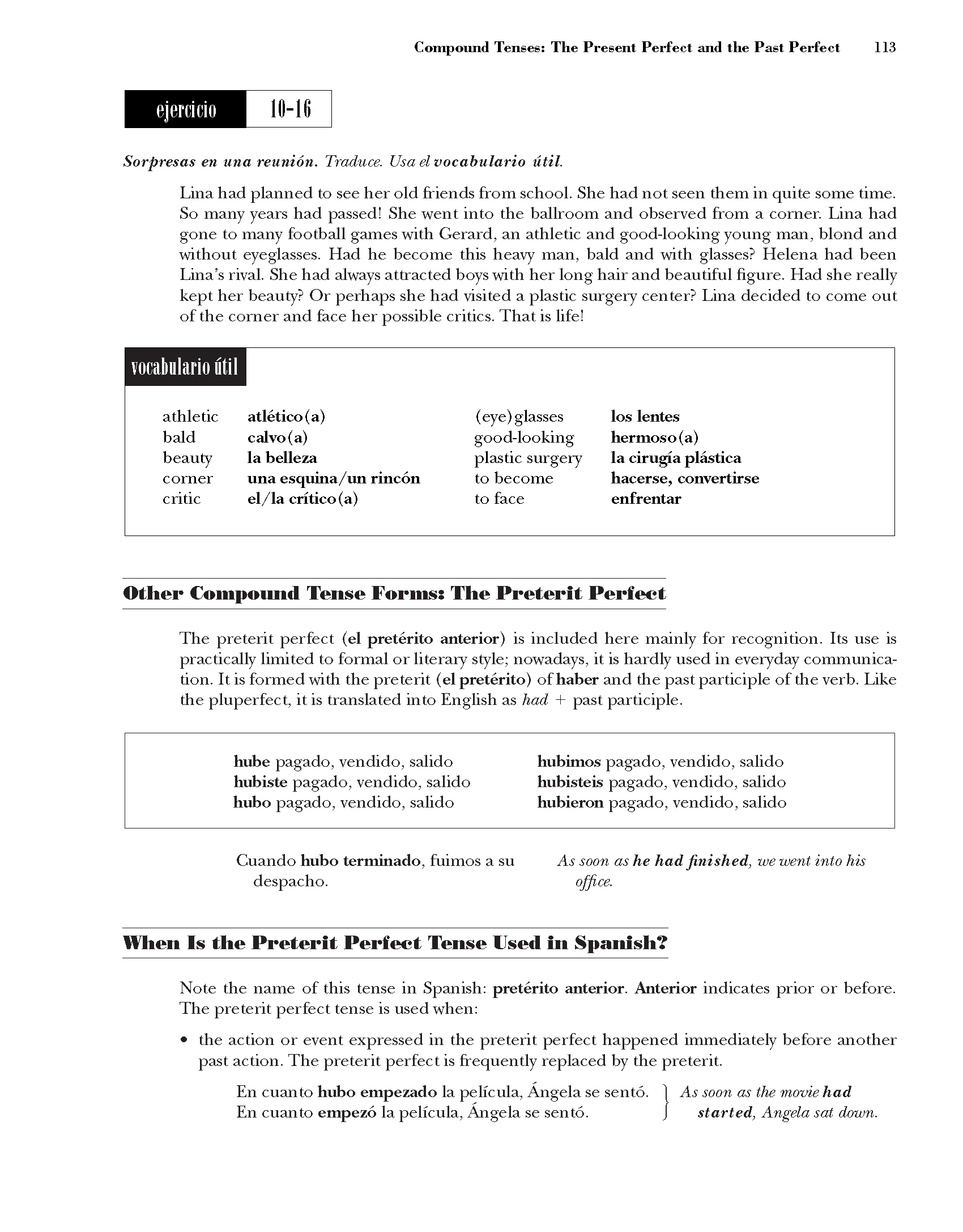CSG124

Compound Tenses: The Present Perfect and the Past Perfect 113
10-16
ejercicio
Sorpresas en una reunión. Traduce. Usa el vocabulario util.
Lina had planned to see her old ffiends from school. She had not seen them in quite some time. So many years had passed! She went into the ballroom and observed from a corner. Lina had gone to many football games with Gerard, an athletic and good-looking young man, blond and without eyeglasses. Had he become this heavy man, bald and with glasses? Helena had been Lina’s rival. She had always attracted boys with her long hair and beautiful figurę. Had she really kept her beauty? Or perhaps she had visited a plastic surgery center? Lina decided to come out of the corner and face her possible critics. That is life!
|
athletic |
atletico(a) |
(eye) glasses |
los lentes |
|
bald |
calvo(a) |
good-looking |
hermoso(a) |
|
beauty |
la belleza |
plastic surgery |
la cirugia plastica |
|
corner |
una esquina/un rincón |
to become |
hacerse, comertirse |
|
critic |
el/la cntico(a) |
to face |
enfrentar |
Other Compound Tense Fornis: The Preterit Perfect
The preterit perfect (el preterito anterior) is included here mainly for recognition. Its use is practically limited to formal or li ter ar}7 style; nowadays, it is hardly used in everyday communica-tion. It is formed with the preterit (el preterito) of haber and the past participle of the verb. Like the pluperfect, it is translated into English as had + past participle.
|
hubę pagado, vendido, salido |
hubimos pagado, vendido, salido |
|
hubiste pagado, vendido, salido |
hubisteis pagado, vendido, salido |
|
hubo pagado, vendido, salido |
hubieron pagado, vendido, salido |
|
Guando hubo terminado, fuimos a su |
As soon as he had finished, we went into his |
|
despacho. |
Office. |
|
When Is the Preterit Perfect Tense Used in Spanish? | |
Notę the name of this tense in Spanish: preterito anterior. Anterior indicates prior or before. The preterit perfect tense is used when:
• the action or event expressed in the preterit perfect happened immediately before another past action. The preterit perfect is ffequently replaced by the preterit.
En cuanto hubo empezado la pe lic ula, Angela se sentó. ] As soon as the movie had En cuanto empezó la pelicula, Angela se sentó. j started, Angela sat down.
Wyszukiwarka
Podobne podstrony:
CSG120 Compound Tenses: The Present Perfect and the Past Perfect 109Wlieii Is the Present Perfect Te
CSG116 Compound Tenses: The Present Perfect and the Past Perfect 105 yo he nosotros/n oso
CSG118 107 Compound Tenses: The Present Perfect and the Past Perfect • Irregular past participles in
CSG122 Compound Tenses: The Present Perfect and the Past Perfect 111ejercicio10-11 Practica. Usa el
CSG132 121 Compound Tenses: The Futurę Perfect and the Conditional Perfect 6. Habr
CSG134 123 Compound Tenses: The Futurę Perfect and the Conditional PerfectOne Morę Use of the Condit
CSG128 Compound Tenses: The Futurę Perfect and the Conditional Perfect 117 11-3 ejercicio La duda. E
więcej podobnych podstron